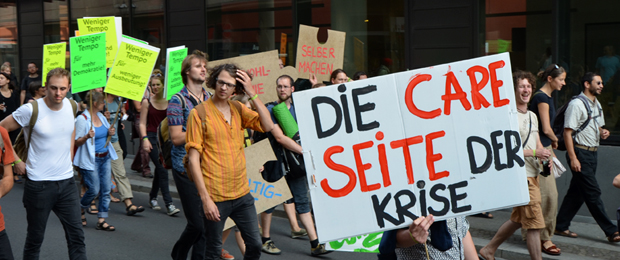If progressives want to fight the movement against so-called ‘gender ideology’, they need to break with neoliberalism
The number of newly elected Members of the European Parliament (MEPs) who oppose women’s reproductive rights, gender equality, sexuality education, same sex marriage and the Council of Europe Convention on Violence Against Women (Istanbul Convention) stands at around 30 per cent. This European Parliament term has therefore seen a doubling of the number of MEPs who claim to fight these issues as compared to the last one, where I estimated around 15 per cent of parliamentarians fell into this category in a
study for Finnish MEP Heidi Hautala.
Issues as diverse as women’s reproductive health and rights, LGBTI rights, sexuality education and preventing gender-based violence are collectively termed by their opponents as being part of a larger agenda of ‘gender ideology’. The use of this ambiguous term has given opponents of women’s and other minority rights the ability to combine several diverging topics under one umbrella and present them as an integral package, allegedly being imposed on ‘traditional families’ by an all-powerful feminist and LGBTI lobby.
Many progressives are baffled by the rise of this phenomenon and often resort to the
backlash or
backsliding discourse to explain it, suggesting it is mere conservative opposition to the inevitable march towards greater gender equality and LGBTI rights. However, this argument has
limited explanatory power, as it ignores the complexities of the right-wing narratives and presents their voters as individually responsible for their rise.
To fully understand what is fuelling this trend, progressives must ask themselves a question that is much more self-reflective: what is the problem with the political, social and economic system in which opposition to these issues is able to capture the imaginations not only of supporters of extreme-right parties but also some of the voters traditionally belonging to the political centre?
As has already been argued, opposition to ‘gender ideology’ allows not only for the divergent causes mentioned above to be brought together under one umbrella, but to also bring together disparate actors, from centre-right to far-right and libertarian parties, as well as various religious movements and conservative grassroots organisations, for a common cause.
Indeed, the increase in opponents of ‘gender ideology’ in the European Parliament comes mainly from the strong performance by Matteo Salvini’s Lega, Nigel Farage’s Brexit party, Jarosław Kaczynski’s Law and Justice, Viktor Orbán’s Fidesz and Marine Le Pen’s Rassemblement National – groups which have little in common in terms of their origins and programmes, aside from their opposition to these issues. While most of these parties belong primarily to the new far-right Identity and Democracy group or the conservative and Eurosceptic European Conservatives and Reformists, Fidesz and Bulgarian GERB are opponents of ‘gender ideology’ within the centre-right EPP, while Slovakian SMER and Romanian PSD represent this trend within the S&D group.
A healthy debate within the progressive movement
While they are not unaware of the divisions in the progressive movement, conservative actors choose to present the debate within the women’s and LGBTI rights movements as homogenous and equally supported by the political mainstream. This allows them to create a false dichotomy between themselves as proponents ‘traditional families’ and the progressives as ‘gender ideologues’ for their own political gain. This picture however, misrepresents the progressive scene as one with a clear and unified agenda, rather than a heterogenous collection of movements, activists, NGOs, academics and public entities with distinct and often disparate opinions and calls. While many of the objectives of these movements are indeed aligned, significant disagreements continue to exist between parts of the feminist movement and the LGBTI movement, as exemplified by the ongoing debate on defining gender as a social construct prescribing roles for men and women and that of a felt sense of identity, or that on surrogacy.
Within feminism itself many divergent schools of thought clash, with liberal feminists opposed to radical feminists in the sex work vs. prostitution debate and Marxist and (neo)liberal feminists disagreeing on the origins and solutions to women’s oppression as being systemic/socio-economic or individual/cultural in nature.
Opposition to ‘gender ideology’, including labour market optimisation efforts, has become a new and very potent form of anti-establishment organising and protesting the neoliberal order.
Regrettably, in view of the abovementioned rise of opposition to many of the progressive movement’s causes, its reaction has been to attempt to silence these internal debates or present them as settled – to the detriment of their quality. It is often argued that the progressive movement cannot be seen to be internally squabbling in the face of the advance of the right, lest they become the ‘useful idiots’ furthering their opponents’ cause. This results in self-censorship as movements do not want to appear to break the joint front in the face of attacks, stifling healthy debate and
creating taboo topics. However, this attitude is not conducive to coming up with either a better understanding of the arguments of the other side, or with appropriate society-wide debates leading to policy-level solutions.
As I wrote elsewhere, the EU’s proposed gender equality measures are designed to optimise the bloc’s economic outcomes and labour market performance and take little interest in promoting reproductive rights or social justice. This lack of the EU’s normative influence is visible in the divergent and often weak approaches taken by EU member states’ in their policies on reproductive rights. That’s true not only for Poland and Malta but also Germany, where
doctors have been prosecuted for providing information on abortion care, wherein describing the procedure has been labelled by anti-choice actors as ‘advertising’ it. The case has sparked debate on the 1933 law limiting the provision of information on abortion in Germany, which has since been
relaxed, but not fully overturned.
Istanbul Convention as collateral damage
Furthermore, EU governments and their state institutions still lack commitment to combatting sexual and gender-based violence as well as domestic violence (see the horrific cases of
sexual violence in Spain and
Ireland which were initially dismissed by local courts). EU governments’ approaches to the sex industry are also absolutely incoherent, ranging from the Nordic model which criminalises the purchase of sex in Sweden, to decriminalisation in Denmark and the legalisation in Germany and the Netherlands. The economic divisions between the countries of origin of prostituted women and those with a high sex industry demand, in addition to persisting gender inequalities in the EU, are laid bare though the legalisation model, which
has been shown to increase demand and in turn promote both
migration and trafficking of women from East Central Europe to the West of the EU.
The EU chooses not to engage on most of these issues, with the notable exception of combating violence against women. However, its efforts in this area are now being thwarted by its own member state governments, including those belonging to the moderate political centre: at the beginning of this year, both the Bulgarian (centre-right) and Slovakian (centre-left) government
refused to ratify the Istanbul Convention – a text designed to increase state efforts to combat male violence against women and provide victims with better protection.
These decisions were taken in the face of popular protests against ‘gender ideology’ (and, in Bulgaria’s case, a
decision by the constitutional court which ruled the Convention unconstitutional). The protests hardly referred to the issue of violence against women but instead accused the Convention of being ideologically driven and denying the distinction between the male and female sexes – a claim that the definition of gender in the Convention (‘social roles, behaviours, activities and characteristics that a particular society considers appropriate for women and men’) clearly refutes.
These developments constituted an additional blow to the EU’s already fraught attempts to ratify the Istanbul Convention as a bloc, which came under increased scrutiny from opponents of ‘gender ideology’ in the wake of a letter from
over 300 (predominantly anti-choice) NGOs. They pointed out that the EU’s own interpretation of the Istanbul Convention appears to define ‘gender based violence’ beyond the confines of the text (i.e. male violence against women), as ‘violence that is directed against a person because of that person’s gender, gender identity or gender expression’.
The disenchantment with neoliberal globalisation
Given the disagreements within and between the feminist and LGBTI movements and the EU’s lack of interest or inability to engage on a number of key gender equality questions, why are these entities facing attacks from opponents of ‘gender ideology’, and how is this movement able to gather so much popular support? This appears to be a symptom of a disenchantment with centrist ‘politics as usual’ and the EU’s all-pervasive neoliberal policies and its member state governments, as well as the values they are perceived to support.
Opposition to ‘gender ideology’, including labour market optimisation efforts, has become a new and very potent
form of anti-establishment organising and protesting the neoliberal order. It perfectly exemplifies the rising dissatisfaction with liberal democracy and its pronounced discourse on human rights and the protection of minorities coupled with a lack of social and economic assurances for wide swathes of the population. Examples of this trend appear across the globe, from Brazil and the US, to Western European states like France and Spain.
Continuing to push forward neoliberal economic and employment policies while continuously eroding social provisions was what drove up support for opponents of equality measures in the first place.
In East-Central Europe, ‘gender ideology’ has become a means of expressing a rejection of the European
East-West hierarchy and the failed promises of capitalist transformation. Indeed, despite assurances that austere economic policies and market liberalisation would allow the region to
‘catch up’ with the West, it continues to lag in economic development and standard of living when compared to ‘old’ EU member states. What was imported instead, often with a patronising attitude, were lessons on ‘correct’ attitudes and values. Voters reject the values of gender equality and LGBTI rights not, as is often agued, because of civilizational ‘backwardness’, but because of the strongly felt disingenuity of neoliberal decision-makers’ concerns for rights, as long as these rights are not social or economic in nature.
The EU’s focus on the labour market participation of women as an indicator of gender equality or ‘emancipation’ is a perfect example. This logic fits in with the EU’s overall neoliberal model of governance, which, especially in times of demographic decline, requires both women’s participation in the paid employment and their (unpaid) reproductive capacity and reproductive labour to continue operating. This message is primarily communicated in a value-laden or normative way: one of the main ways to achieve gender equality is ensuring women’s equal participation in the labour market. The more a country’s employment force structure diverges from this ideal, the more ‘catching up’ it has to do to reach the developed or enlightened club of ‘old’ member states – never mind that women’s increased availability to take up paid employment in West European countries may be facilitated by the (often underpaid and unregulated)
care work of East Central European women.
This workplace ‘empowerment’ model is completely at odds with many Polish women’s experience of the neoliberal labour market since the transformation. Indeed, their work experience has been far from emancipatory – they were the ones who
bore the brunt of the consequences of the de-regularisation of the labour market post-1989, working in low-pay, low-status service industry jobs.
What progressives need to do
Alongside a host of other measures targeting women and families with additional social protections, the Law and Justice (PiS) government has introduced its flagship 500+ programme, which guarantees an unconditional monthly cash transfer of €120 per each child from the second one, and from the first one for families in particular financial difficulty. This has allowed some of them to escape the harsh conditions of the labour market and helps explain the party’s popularity among women.
As I argued with Weronika Grzebalska, women’s strong support both for PiS and its social programmes stems from these programmes meeting women’s pragmatic interests in a society governed by neoliberal policies and allows to glean some insight into why the anti-‘gender ideology’ party continues to attract a significant voter base, gathering 45.4 per cent of the votes in the European election of May 2019.
If progressive political movements want to regain the electorate that is currently increasingly voting for parties espousing the war on ‘gender ideology’ (whether it be because of this position or despite of it), it must reflect on how much of this state of affairs is in fact due to the rejection of the neoliberal world order, rather than opposition to specific groups’ rights. Continuing to push forward neoliberal economic and employment policies while continuously eroding social provisions was what drove up support for opponents of equality measures in the first place.
Moreover, voters feel a lack of recognition and representation if popular concerns are dismissed as ‘backwards’, hotly contested issues presented as settled and beyond debate and any critique of progressive positions coming from within the camp labelled as being the ‘useful idiot’ of the right. Any political programme that wants to reverse this trend must address these issues and introduce policies which coherently address socio-economic needs in the field of gender equality and support for minorities.
This post is republished from International Politics and Society. Read the original article here.


